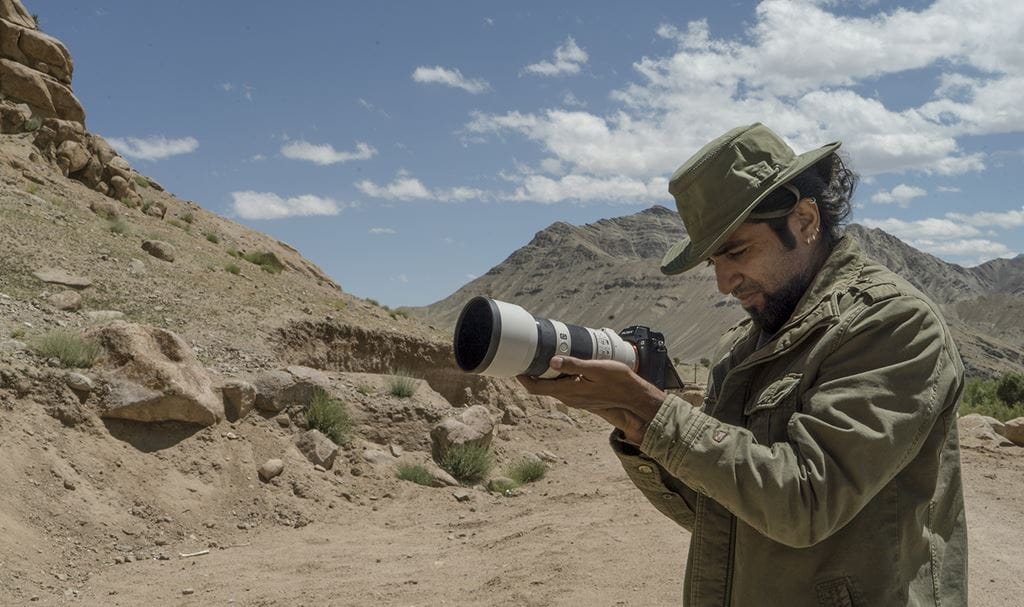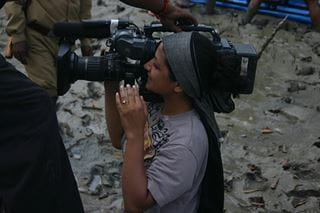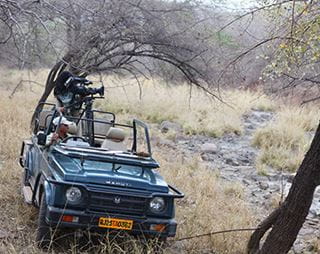
Nature docs from New Delhi
 by Meagan Kashty – Jun 8, 2018
by Meagan Kashty – Jun 8, 2018 As movie stars descend into Toronto to showcase their blockbuster films, Gautam Pandey and Doel Trivedy are working tirelessly at their New Delhi-based production company on their own passion projects.
The husband-wife duo lead Riverbank Studios — a production company focused on wildlife and conservation films.

Alongside the company’s corporate work, Riverbank’s docs have followed the exotic western tragopan, a bird that had never been filmed in the wild in India; explored the significance of the high altitude lakes found in the Indian Himalayas; and tackled the devastating effects veterinary drugs have had on India’s vulture population.
Pandey and Trivedy credit Sheridan with helping to refine the technical and analytical filmmaking skills they spent the better part of their lives working on.
Riverbank was established in 1973 by Pandey’s father, and as one of the first film studios in North India, it soon carved a niche in the industry for projects focused on conservation and wildlife.
Riverbank’s 1994 film The Last Migration was the first Asian film to win a Green Oscar – one of the most coveted awards for wildlife and environmental filmmakers. Another doc, Shores of Silence: Whale Sharks in India (2000), prompted the Indian government to introduce legislation to ban the fishing of whale sharks.
As such, Riverbank has became something of a family business, with Pandey’s love of filmmaking having been fostered from a young age. “This is all I knew — what else could I do?” he laughs.
Trivedy, on the other hand, stumbled upon Riverbank while she was looking for a place to work that was meaningful. “When you’re young, you want to change the world,” she explains. She began at Riverbank as a trainee, working under her future father-in-law before she and Pandey began dating.
Although working at Riverbank gave Pandey and Trivedy ample experience and skill, they thought it would be beneficial to go back to school to pick up new techniques and learn about industry trends.
“Even though I had been working with film all my life, I thought going to Sheridan would give me the confidence I needed to do more on my own,” says Pandey.
Sheridan’s Advanced Television and Film program was particularly appealing because it catered to individuals with professional experience, and meant Pandey and Trivedy would be close to Canadian production companies they hoped to work with.
The pair — who were unmarried at the time — hopped a plane to Toronto, finding a temporary home in a basement apartment near Sheridan’s Trafalgar campus.
Sheridan’s equipment was also a huge draw for the couple. At a time when HD was still new in Canada, and almost unheard of in India, Pandey and Trivedy were able to train on top-of-the-line tech, always with the intention of bringing those skills back to Riverbank.
Pandey and Trivedy stayed in Canada for a year after graduating in 2006. Pandey worked odd jobs, and Trivedy scored a gig with Discovery for a special Daily Planet series focused on India. That show eventually travelled to India for production, giving Pandey and Trivedy the perfect opportunity to return to New Delhi together, as they had always intended.
While Pandey rejoined Riverbank immediately, Trivedy took on stints with CTV and a non-profit children’s content creator. They were married in 2008, and Trivedy rejoined Riverbank two years later.
“I spent a few years doing my own thing, but I love the influence that documentary can have,” she says. “If I wasn’t doing this, I’d be in TV production — it would be good money, but I don’t know how satisfied I’d be at the end of the day.
“We do keep returning to awareness, education and conservation — we tend to circle around areas of change and impact. And now we feel like we have enough experience under our belt and a global network that will allow us to focus on our own creative projects.”
Together, Pandey and Trivedy are trying to continue the legacy that was established by Pandey’s father. It’s a challenging feat, given India’s documentary industry is practically non-existent.
“There are very few platforms in India that support doc filmmaking, and not many opportunities in broadcast,” says Trivedy. “We have to do a lot of commercial work to keep us running, but we also try to push doc-style productions onto broadcasters. They want entertainment programming, so it’s tough, but we’re inching forward every day.”
 Nevertheless, Riverbank continues to push towards making conservation-driven wildlife films has committed to creating awareness-generating content.
Nevertheless, Riverbank continues to push towards making conservation-driven wildlife films has committed to creating awareness-generating content.
In 2017, the company had two docs broadcast on Animal Planet India: Gyamo – Queen of the Mountains, which looks at the challenges snow leopards face through the lens of one mother and her two cubs; and Looking for Sultan, which features Pandey and his father’s search for a tiger that has mysteriously vanished from Ranthambore National Park.
Although the industry is challenging, both Pandey and Trivedy can’t imagine doing anything else. Going forward, Riverbank is looking to lean into wildlife programming in an effort to compete on a global scale. They’re constantly pitching projects — 50 or 60 in a year — and say they feel like people are now sitting up and listening to wildlife film ideas, even in India.
Successes such as BBC’s Planet Earth have proven that there’s an international appetite for wildlife documentary filmmaking, but Trivedy says that although interest has increased, budgets have dropped. “Broadcasters are expecting us to deliver more with less,” she says.
Pandey and Trivedy — along with their four-year-old Ira — are ready to reinvent and evolve broadcasters' perceptions of wildlife programming and India-based production companies.
“We do keep returning to awareness, education and conservation — we tend to circle around areas of change and impact,” says Trivedy. “And now we feel like we have enough experience under our belt, and a global network that will allow us to focus on our own creative projects.
Media Contact
For media inquiries, contact Sheridan’s Communications and Public Relations team.





